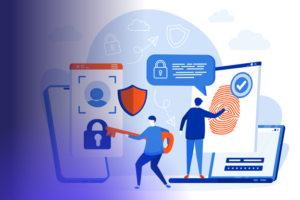Enhance the Customer Experience With Advanced Identity Verification Services
- 1 What is Online Global ID Verification?
- 2 Essentials of Validation of Identity For Businesses
- 2.1 Know Your Customer Validation
- 2.2 Multiple Layers of Privacy
- 2.3 Minimizing Fraudulent Activities
- 2.4 Cost-Effective
- 2.5 Improving the Customer Service
- 3 Digital Identity Verification For Finance
- 4 Conclusion
- 5 FAQs
- 5.1 What is Advanced Identity Verification (AIV)?
- 5.2 Why is Advanced Identity Verification important?
- 5.3 What are the common methods of Advanced Identity Verification?
- 5.4 How does biometric AIV work?
- 5.5 Is AIV more secure than traditional username and password methods?
- 5.6 What are the privacy concerns with AIV?
- 5.7 Are there legal and regulatory requirements for AIV?
- 5.8 What challenges does AIV face in real-world applications?
- 5.9 Can AIV be bypassed or hacked?
- 5.10 How is AIV evolving in the future?
- 5.11 What industries benefit from AIV?
- 5.12 How can individuals protect their identities in AIV systems?
While the digital world is offering diverse benefits, it is also scaring businesses with advanced criminal activities. With the progression of the digital world, the threats related to online platforms, including identity theft, information leakage, and cyber crimes are also expanding. It has been recorded in recent years, that the worldwide average number of cybercrime cases was 16 thousand and it is increasing over time. To protect businesses from scammers it is necessary to incorporate identity verification services within systems, that will allow the companies to move forward in their successful future.
Remote companies have this urge to create better customer service, which is only possible through advanced identity verification services. This blog will discuss the importance of customer validation through ID verification services.
What is Online Global ID Verification?

Identity verification is the process of validating the ID documents of the particular customer whom the company wants to link with. It provides prior knowledge about the customer, which assists the businesses in their decision-making procedure. Through ID verification, companies feel safe while connecting with a client, as it reduces the risks of unauthorized ones.
Essentials of Validation of Identity For Businesses
Companies require ID proofs for sending their products to customers. And if the original ID documents are left in the hands of illegitimate resources, then the customers have to pay for it. Therefore, to provide customers with complete security, it is necessary to implement online verification services that will save them from digital identity thefts.
-
Know Your Customer Validation
It is necessary for a business’s success that they should know about their customers. When companies learn who their clients are before making connections, then, this process helps them in ensuring that they are selling products to the authentic ones.
-
Multiple Layers of Privacy
When the customers leave the companies alone with their verified identity after the submission process they are hoping for a successful system from which their important details will not be stolen. By implementing identity verification services, companies can conveniently gain legitimate clients with less effort and time.
-
Minimizing Fraudulent Activities
Business owners have the responsibility to protect their companies from any kind of fraudulent activities. ID verification assists businesses in combating money laundering and criminal attacks. It also helps them maintain their regulatory compliance. Validation of identity safeguards the companies from heavy penalties, including hefty fines and incarcerations. Moreover, it also protects the businesses from reputational damage. For instance, if a company gets involved with an illegitimate party then the authorities will give punishments to both, which will result in loss of targeted customer’s confidence.
-
Cost-Effective
In this growing digital world, every business owner is in search of a solution that will help them in minimizing their expenses. Therefore, Identity verification provides a cost-effective service to companies through which they can instantly complete the verification procedures with less money and effort.
-
Improving the Customer Service
Identity Verification services assist businesses in providing their customers with fast and reliable solutions that validate clients within a matter of seconds. These services have enhanced the credibility and productivity of the companies. Moreover, it creates a trusted relationship between the consumers and the businesses.
Digital Identity Verification For Finance
The fintech industry is one of the high priorities of scammers. They are trying their way best to deceive the financial businesses with their new tricks. For these reasons, identity verification services assist the finance-based sectors in dealing with advanced problems, including drug trafficking, money laundering, and digital identity theft. By incorporating the authentication of ID services within the systems, businesses can create a good image of them in the eyes of their targeted customers.
Conclusion
Digital ID verification is a must-have for all those businesses that want to achieve their targeted goals and respect from their clients. Identity validation also assists businesses in providing a seamless onboarding procedure with their customers. This verification service minimizes the higher risks of fraudulent activities, including money laundering and digital identity theft. Moreover, ID identifiers are way faster, more reliable, and more effective than other manual systems in which the customers have to present themselves physically. Now, with advanced identity verification, clients can conveniently verify themselves by staying at their homes. Identity verification is a necessary step for all legal bodies to ensure that they are getting a better future.
FAQs
What is Advanced Identity Verification (AIV)?
Advanced Identity Verification is a set of processes and technologies that go beyond basic identity verification methods like usernames and passwords. AIV methods include biometrics, document verification, and behavioral analytics to establish and confirm an individual’s identity.
Why is Advanced Identity Verification important?
AIV is crucial for security and fraud prevention. It helps ensure that the person accessing a system or service is who they claim to be, reducing the risk of unauthorized access and fraudulent activities.
What are the common methods of Advanced Identity Verification?
Some common AIV methods include biometrics (fingerprint, facial recognition, iris scans), document verification (passport, driver’s license), knowledge-based authentication (answering security questions), and behavioral analytics (tracking user behavior).
How does biometric AIV work?
Biometric AIV uses unique physical or behavioral traits to identify individuals. For example, facial recognition technology scans a person’s face, while fingerprint recognition analyzes their fingerprint patterns.
Is AIV more secure than traditional username and password methods?
Yes, AIV is generally more secure because it relies on unique and difficult-to-fake attributes of an individual, such as biometrics. However, it’s not completely foolproof and can be susceptible to certain types of attacks.
What are the privacy concerns with AIV?
AIV raises privacy concerns related to the collection and storage of sensitive personal information. Ensuring data protection and compliance with privacy regulations (e.g., GDPR) is crucial.
Are there legal and regulatory requirements for AIV?
Yes, many industries and regions have specific regulations and compliance requirements related to identity verification. These regulations may include Know Your Customer (KYC) and Anti-Money Laundering (AML) rules.
What challenges does AIV face in real-world applications?
AIV can face challenges such as false positives and false negatives, usability issues, and the potential for data breaches if not implemented securely. Balancing security with a seamless user experience is a challenge.
Can AIV be bypassed or hacked?
While AIV is more secure than traditional methods, it is not completely immune to attacks. Biometric data can be spoofed, and systems can have vulnerabilities that hackers may exploit. Continuous monitoring and updates are essential.
How is AIV evolving in the future?
AIV is likely to continue evolving with advancements in technology. This may include the integration of AI and machine learning for better accuracy and adaptability, improved anti-spoofing measures, and increased support for remote and mobile identity verification.
What industries benefit from AIV?
AIV is beneficial in various industries, including finance (for secure online banking), healthcare (to protect patient data), e-commerce (for fraud prevention), and government (for secure access to services).
How can individuals protect their identities in AIV systems?
Individuals should use strong, unique passwords, enable multi-factor authentication (if available), and be cautious about sharing personal information online. They should also monitor their accounts for any suspicious activities.


















